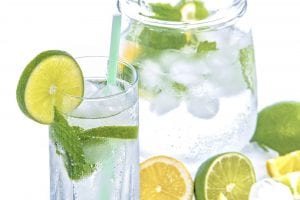It’s summertime in Arkansas. We all know what that means. Hot days, warm nights, with excessive heat and even more humidity.
Whether playing golf, riding your bike, walking the dogs, or doing a little yardwork, when we get hot, our internal thermometer will respond by attempting to cool itself. The human body is made up of over 60% water and that is a reminder of how important it is to avoid dehydration. Water is essential for life and our best choice for refueling.
For the average person, who does light outdoor activities, the recommendation on how much water to drink is 8 – 10 glasses a day. Older adults have a higher risk than younger adults of becoming dehydrated, especially during the hotter months of the year. If you work outside or exercise a lot, you’ll need to drink more water per day than someone who doesn’t sweat as often. If you take certain medications, such as a diuretic, you need to drink more water than the average person since you urinate more often. Athletes need to take extra precautions by drinking water one hour prior to exercise, every 15 minutes during exercise and an hour after exercise.
You can also stay fully hydrated by eating foods with high water content. Fruits such as watermelon and oranges or vegetables like celery, tomatoes, and cucumbers provide a nutrient-rich water source. Coffee and tea can also count. However, you should limit your intake of alcohol, because it is a diuretic. Diuretics make you urinate more and lose additional fluid.
Drinking sufficient levels on a daily basis is an important part of your bladder and kidney health. Good hydration is thought to help ‘flush out’ bacteria from the urinary tract and avoid infections (UTIs). It also helps to decrease the concentration of substances and crystallization involved in kidney stone formation.
When first becoming dehydrated, you might simply experience increased thirst. For most people, this is a very good indication that you need more water. Even before you become dehydrated, you’ll feel thirsty, and your mouth may feel dry or sticky.
You can also tell if you are getting enough fluids by checking your urine. It should be light-colored (pale yellow) and you should be urinating every 2-4 hours. Additional warning signs include becoming lethargic, dizzy, having muscle cramps, fatigue, and other unpleasant symptoms. Our thinking and cognition can suffer. We might lose appetite, experience mild constipation and lightheadedness, or kidney stones. Mild dehydration is easy to reverse – simply drink more water. Severe dehydration, on the other hand, requires immediate medical treatment.
As we enter into what is typically the hottest time of the summer months, be safe and drink plenty of water.




